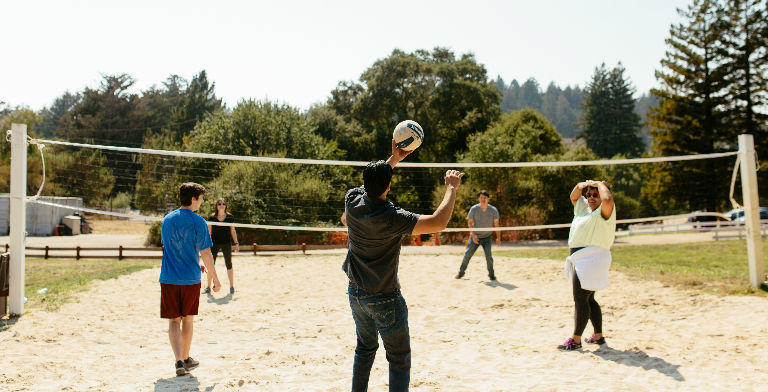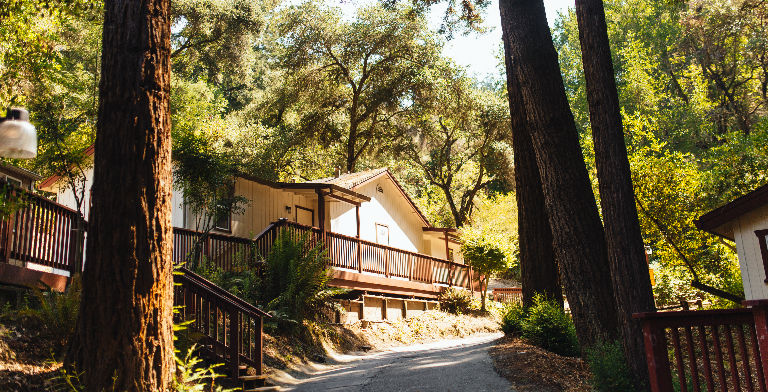The Camp Recovery Center helps adults struggling with inhalant addiction find long-term recovery. Located near Scotts Valley & San Jose, CA, The Camp provides premier inhalant addiction rehabilitation.
Inhalant Addiction Rehab
Inhalant Addiction Rehab Near Santa Cruz & San Jose
Inhalant abuse, which is also often referred to as huffing, sniffing, dusting, or bagging, is a dangerous and potentially deadly practice involving items that are commonly found in homes and workplaces. Experts estimate that between 20 and 30 million adolescents and adults have abused an aerosol, gas, nitrate, or a volatile solvent at least once in their lives. Inhalant abuse is associated with a variety of short and long-term damaging effects, ranging from headaches and temporary disorientation to irreversible brain damage and death. Due to the wide variety of inhalants that are abused, and the powerful effects that these substances can produce, chronic inhalant abuse can be difficult to stop without getting professional help.
At The Camp Recovery Center, we understand the dangers posed by inhalant abuse, as well as the obstacles that can prevent a person from overcoming the compulsion to engage in this life-threatening behavior. Over the past 30 years, we have developed specialized rehabilitation programming that has proved to be extremely effective in helping adults end their addiction to inhalants and develop the skills and strategies that will allow them to live drug-free lives.
Helping a Loved One
Helping a Loved One or Family Member Enter Inhalant Addiction Rehab
Discovering that someone you care about has become addicted to inhalants can be a disconcerting experience. In addition to being concerned about your loved one’s physical and mental health, you may also feel helpless in the face what can appear to be an overwhelming problem. Inhalant addiction is a serious issue that is best dealt with by an experienced professional, and rehab at a treatment center. However, this does not mean that you have no role to play. Consider the following:
- Educate yourself about inhalant addiction. This is an often misunderstood form of substance abuse, so talk to experts or consult authoritative sources to learn the truth about what your loved one is experiencing.
- Learn about treatment centers in the Santa Cruz & San Jose areas. The most effective forms of substance abuse treatment are comprehensive rehab programs that are capable of addressing underlying issues and/or co-occurring disorders.
- Identify rehab centers that seem to be a good fit for your loved one. Remember, there is no such thing as a perfect treatment program. Your goal should be to find the program that is best suited to meeting your loved one’s specific needs.
- Volunteer to help with making appointments, providing transportation, arranging for childcare, or taking care of other logistical issues that will allow your loved one to focus on getting help.
- Stay involved with your loved one throughout his or her time in rehab. Send letters of support, participate in family programming, and prepare to be an active part of your loved one’s aftercare support network.
Rehab and recovery from inhalant addiction is a long process that will likely involve both successes and setbacks. The best thing you can do for your loved one is to continue to be an active positive presence in his or her life. Celebrate the good times, be a source of consolation during the darker days, and never let your loved one lose sight of the fact that he or she has your full support.
Why Consider Us?
Why Those Near Santa Cruz & San Jose Should Consider Inhalant Addiction Treatment at The Camp Recovery Center
It is difficult to overstate the negative impact that inhalant addiction can have on a person’s life. There is no such thing as safe or moderate inhalant abuse. Every time a person engages in this behavior, he or she is at risk for a wide range of life-changing consequences, including sudden death. Negative physical effects that have been associated with the continued abuse of aerosols, gases, nitrates, and volatile solvents include muscle weakness, coordination problems, hearing loss, vision problems, and potentially irreversible damage to the liver, kidneys, lungs, heart, and brain. Depending on the nature and severity of a person’s inhalant addiction, he or she may also develop depression, long-term memory loss, and irreversible cognitive impairments. Enduring these types of problems puts a person at increased risk for academic problems, job-related setbacks, strained interpersonal relationships, and related damage to both the substance and quality of his or her life. Thankfully, there are rehab centers that provide quality treatment for those struggling with an addiction to inhalants.
Types of Treatment
Types of Inhalant Addiction Treatment
Nestled in the foothills of the majestic Santa Cruz Mountains, The Camp Recovery Center is a place of hope and healing where clinically sophisticated rehab is provided in a serene and secure environment.
For more than 30 years, The Camp has remained dedicated to providing the highest quality of life-changing rehab to adults who are struggling with inhalant addiction and other forms of chemical dependency. Individuals who choose to receive treatment at our rehab center have the opportunity to work with talented and experienced nurses, addiction counselors, family therapists, and other professionals whose clinical expertise is surpassed only by their commitment and compassion.
Rehab at our treatment center is a highly personalized experience, with each resident following a plan that has been customized to ensure that we are providing the type and level of care that best meets his or her unique needs. The following are among the many elements that may be included in a resident’s rehab plan at The Camp:
Detoxification: For individuals who have been unable to rid their bodies of drugs prior to arriving at The Camp, detoxification can be an essential precursor to full participation in treatment. When a resident is determined to be in need of detox services, we coordinate with an offsite doctor, typically in the Santa Cruz & San Jose areas, who will develop and approve an appropriate detox protocol. As is the case with all aspects of treatment at our rehab center, detox protocols are developed and implemented in the manner that best meets the specific needs of each resident.
Medication management: Residents whose inhalant addiction is accompanied by a co-occurring mental health condition may receive a referral to meet with a psychiatrist to determine if prescribed medication should be incorporated into their rehab or treatment. Residents who receive medications will meet with the psychiatrist on a weekly basis to monitor their progress and adjust their prescriptions if necessary. Members of our nursing staff also assist in monitoring residents’ medications.
Individual therapy: Residents receiving inhalant addiction treatment meet with their case managers two times each week for individual therapy sessions. These sessions allow residents to process their experiences, discuss their rehabilitation progress, and address any concerns have arisen since the previous session.
Group therapy: Group therapy is an essential part of treatment for inhalant addiction at The Camp. A variety of groups are scheduled every day, including weekends. Process groups are conducted five days a week. The following are examples of specific groups that may be conducted during a resident’s time at The Camp:
- Activity Group
- CBT Groups
- Detox Groups
- Experiential Group
- Focus Groups
- Music / Poetry Groups
- Men’s Group
- Women’s Group
The following are a few examples of the many topics that may be addressed in group therapy sessions at The Camp:
- Self-helping thinking
- 12-Step Recovery
- SMART Recovery
- Relapse prevention
Family therapy: Residents receiving treatment for inhalant addiction have the opportunity to participate in family therapy sessions twice each month. These sessions, which are led by marriage and family therapists, are designed to facilitate healthy communication among family members, address negative feelings and emotions that arise due to inhalant abuse, and promote the healing and strengthening of the family unit. Family therapy sessions take place at our treatment center, which is convenient to both Santa Cruz & San Jose, CA.
Experiential therapy: A variety of experiential therapies are scheduled every week at The Camp. Residents also have the opportunity to spend time in our gym six days a week. Additional experiential therapies at our rehab center include the following:
- Acupuncture
- Meditation
- Yoga
Community meetings: Resident-run community meetings are held every morning, including both weekdays and on the weekends. These meetings, which are a major component of the rehab process at The Camp, provide an opportunity for residents to review the agenda for the day, do readings, and address any issues that are relevant to the group. In addition to being sources of important information, community groups promote healthy independence and interdependence while also facilitating the forming of productive sober relationships that can be essential to supporting long-term recovery from inhalant addiction.
At The Camp Recovery Center, we know that residential rehab is just one step on the path of lifelong recovery from inhalant addiction. To ensure that every adult who completes treatment with us is best prepared for the next phase of his or her recovery, our case managers work closely with all residents to ensure that sources of continuing care and support have been identified, and all necessary arrangements for accessing this care have been made prior to discharge.
For adult residents who need a more structured level of care during their transition from residential rehab, we also offer intensive outpatient programming (IOP). Our intensive outpatient programming is convenient to Santa Cruz and San Jose, CA.
In the same manner that we provide a highly personalized rehab experience during a resident’s time at our treatment center, we are similarly dedicated to ensuring that, as they prepare to leave our campus, all residents have a continuing care plan that addresses the specific issues that are essential to their long-term recovery from inhalant abuse.
















